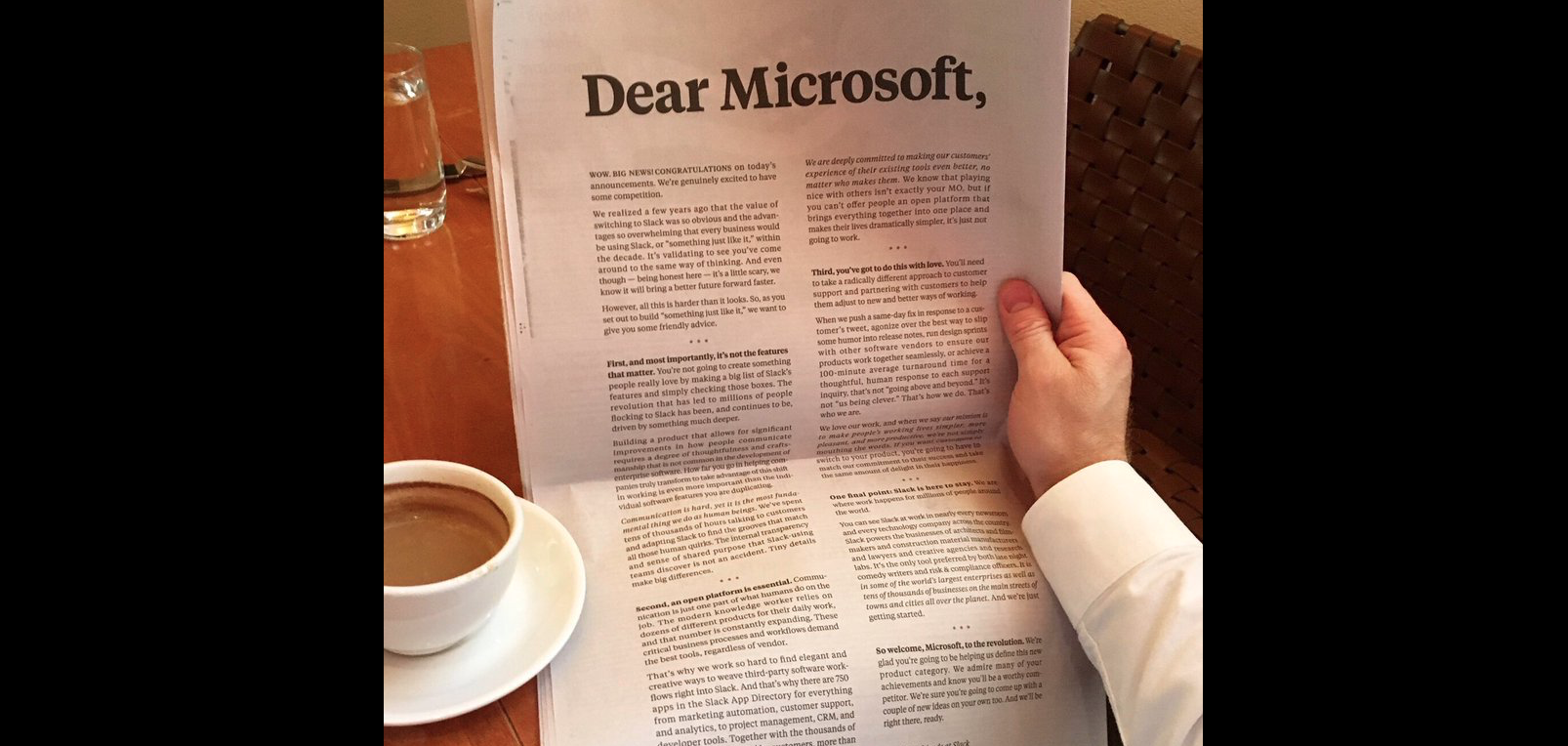Slack Teases Microsoft

Slack just published a full page ad in the New York Times to welcome Microsoft Teams to the group messaging market. I thought it's a great opportunity to play with the topic and try to predict how it'll unfold. I had a fierce conversation with friends about that (on... ekhm Slack). Some of them said Slack is afraid or should be. Not the way I see it.
Disclaimer: I don't like Slack as a phenomenon. I strongly prefer async communication via email, blogs & wiki. At the same time I'm a daily user of Slack for 2+ years in teams ranging from 15 up to 700 people.
MS Teams is a no threat to Slack
Slack has shown over the years that they are great at developing their product. Not only that, they also have a great feel for people's psychology. That's the same thing Facebook had from the very beginning.
In order build such an addictive, sticky and viral product like Slack you really need to get a lot of things right. There's research, science and engineering - things Microsoft can theoretically match. But Slack also has lots of liberty to iterate quickly thanks to the freedom from legacies: technical, product, market and legal. Building such a cool messaging platform also requires a certain culture and processes in the company. On top of that it takes intuition.
Microsoft will launch a product that mimics the features of Slack without any understanding of the underlying art & psychology. And Slack knows it:
First, and most importantly, it’s not the features that matter. You’re not going to create something people really love by making a big list of Slack’s features and simply checking those boxes.
Just like they did with Windows. Three years ago when switching from Windows to Mac I realised that Microsoft never got the windows metaphor. They only replicated the functionality.
Back then Microsoft won, but it was a different kind of market. The product experience wasn't as important as the list of features and distribution. Nowadays things changed. People (and teams) pick their tools the way they like in many cases. They pick the best or the ones they like the most. And Slack has some serious likeability...
Ok, I get that Microsoft may have a huge installed base just because of their existing client base. They may be leaders in "active" users count depending on how they'll count them. But does having ghost teams and users count as a success?
Why Did Slack Do It?
Slack used Microsoft Teams launch to confirm their leadership position and generate some controversy. They definitely earned a lot of media attention thanks to this move. It's just a marketing stunt and perhaps an attempt to break through to the awareness of the majority.
The main problem Slack has right now is flattening growth as the early adopter market gets saturated. Now the question is whether they'll be able to cross the chasm to the mainstream market that may or may not materialise. In case it does it'll have different needs. Slack's challenges ahead are between their product and the new users's willingness to try such a product.
Why MS Teams are good for Slack?
Microsoft entering this space is a great thing for Slack. First they will bring the awareness of this class of products to the masses. It validates the importance of this market and makes it bigger for all the players.
At the point when a team decides to use a team chat/messaging tool they'll either pick the one they like (Slack) or the one that is the leading technology (Slack). Or the one their CIO has purchased in bulk, which means they won't use it anyway. (Think about those corporate Facebook clones - ever saw them being used?)
I have seen the amazing power of Slack adoption among early adopters. Slack won in companies running the Atlassian stack, in teams already using Hipchat. I saw Slack being used in companies where it was forbidden to use Slack. It's unstoppable among certain people, who like this form of communication.
The best part
The best part is this. Slack described exactly how to build a great product in the messaging space, because they know Microsoft is not able to replicate it anyway:
Building a product that allows for significant improvements in how people communicate requires a degree of thoughtfulness and craftsmanship that is not common in the development of enterprise software.
The two companies are playing a different game. Slack is competing with email and SMS, not Hipchat or Microsoft Teams. Microsoft is adding a box to their product portfolio that is expected by some of the clients. Or is necessary for Microsoft to be present on Gartner charts.
(The passive-agressive form of the Slack letter is something to be worried about though).
